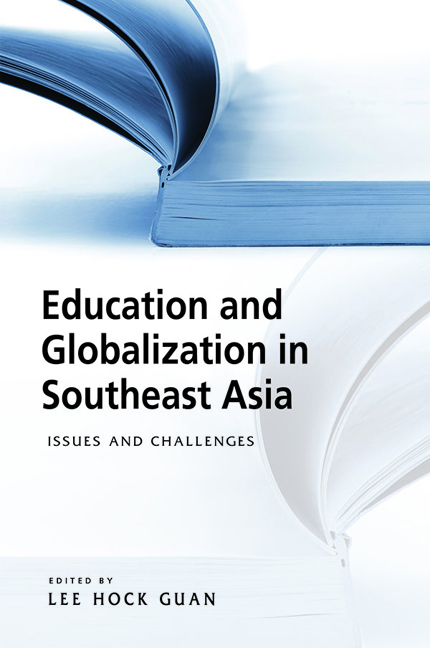Book contents
- Frontmatter
- Contents
- Acknowledgements
- Contributors
- Introduction
- 1 English in Singapore and Malaysia: Common Roots, Different Fruits
- 2 Globalization, Educational Language Policy and Nation-Building in Malaysia
- 3 Second-Order Change Without First-Order Change: A Case of Thai Internationalization of Higher Education
- 4 Higher Education in Malaysia: Access, Equity and Quality
- 5 Indonesian Higher Education: Gaps in Access and School Choice
- 6 Increasing Access to and Retention in Primary Education in Malaysia
- 7 Primary and Secondary Education in Myanmar: Challenges Facing Current Reforms
- Index
1 - English in Singapore and Malaysia: Common Roots, Different Fruits
Published online by Cambridge University Press: 12 January 2018
- Frontmatter
- Contents
- Acknowledgements
- Contributors
- Introduction
- 1 English in Singapore and Malaysia: Common Roots, Different Fruits
- 2 Globalization, Educational Language Policy and Nation-Building in Malaysia
- 3 Second-Order Change Without First-Order Change: A Case of Thai Internationalization of Higher Education
- 4 Higher Education in Malaysia: Access, Equity and Quality
- 5 Indonesian Higher Education: Gaps in Access and School Choice
- 6 Increasing Access to and Retention in Primary Education in Malaysia
- 7 Primary and Secondary Education in Myanmar: Challenges Facing Current Reforms
- Index
Summary
INTRODUCTION
Singapore and Malaysia share a common history as colonial territories of the British. Each gained their independence from the British at around the same time, with the two countries even bound together as a single nation for a short period of time. Yet, if we examine the language policies of the two nations, we see a distinct difference in the paths that Singapore and Malaysia have taken in their approaches to managing linguistic diversity, and in their stances towards English. While Singapore has unambiguously embraced the utilitarian value of English and placed it as central to its language in education policies, Malaysia has, in many ways, been more Ambivalent and circumspect about the value and place of English especially in relation to Malay.
In this chapter, we examine how their language policies have also sprung from very different sets of ideologies about language, which has meant that despite their common roots, Singapore and Malaysia have taken significantly divergent paths, resulting in very different outcomes or “fruits”. The chapter is organized in three sections. In the first section, we trace the historical development of English in Singapore; in the second, we examine that of Malaysia, followed by a discussion which compares and contrasts the language in education policies of these two countries.
SINGAPORE
The Republic of Singapore is a relatively young nation, which celebrated only its fiftieth year of independence in 2015. Despite this, and the fact that it is a small island with no natural resources apart from its geographical position, Singapore has grown to become a thriving metropolitan country with a Gross Domestic Product (GDP) (adjusted for Purchasing Power Parity) per capita that remarkably ranks it as the third richest nation in the world (International Monetary Fund 2014). This outstanding achievement is no mean feat for a country less than half the size of London and which less than fifty years ago had a GDP that placed it as a struggling Third World nation. Among the many factors credited for Singapore's phenomenal economic success are its language policies, seen by the Singapore government as instrumental to its economic competitiveness (Ng 2008).
- Type
- Chapter
- Information
- Education and Globalization in Southeast AsiaIssues and Challenges, pp. 14 - 35Publisher: ISEAS–Yusof Ishak InstitutePrint publication year: 2017



